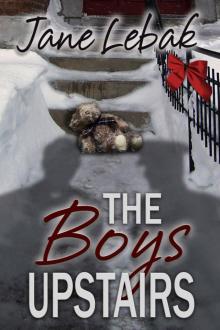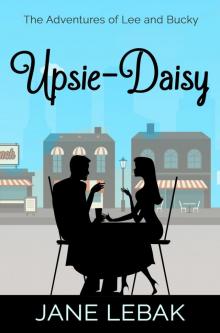- Home
- Jane Lebak
Pickup Notes Page 14
Pickup Notes Read online
Page 14
Ah, so she lived in Queens. “I’m going up to 32nd.” And I messaged Dad that I was on my way.
As we walked uptown, Shreya said, “Why are you doing this? In my ignorance, I thought newspapers could be had in all parts of Manhattan.”
I shrugged.
Shreya added, “And his office has no internet?”
I stared at the pavement. “Don’t ask me to explain my parents.”
It was odd being alone with Shreya. Normally practice ended and she took off, and we didn’t hear from her again until next time. She wasn’t on Facebook, hadn’t provided a home phone number, told us nothing about her life. I’d never gone anywhere with her before.
Even the way we’d found her was bizarre. The night Peter left, Harrison with his typical insight realized that a string quartet with only one violinist is actually a “string trio,” and, with equal insight, that we were screwed. He’d decided on the time-honored tactic of getting well-lit.
Three drinks later, he’d turned to the tall blue-haired Indian woman ordering a Long Island iced tea with a fake ID. He paid for her drink, saying, “I can play the violin.”
That’s not a bad pickup line, if you’re wondering, and Harrison made himself look completely cute too. But Shreya only shrugged. “So can I. Thanks for the drink.”
Not ready to give up, Harrison trailed her to a table and ten minutes later, because this was Manhattan, someone turned up a violin. Shreya made magic while Harrison stared. Then, dumbfounded, he exclaimed something to the effect of “Forget about sex—come join my quartet!”
That was us, thoroughly professional. I don’t recommend recruiting that way, but Shreya sounded just as good when we were sober, and she seemed to think we’d do for now.
When we reached my dad’s office, Shreya said, “I’ll catch up.”
I said, “You don’t have to. I’m just going to drop this off.”
Shreya said, “I thought maybe we’d get lunch. Do you have time?”
The response was automatic. “I have time, but no money.”
She started. “Really? It’s not Le Bernardin.”
I ran through my budget, through the extra gigs we’d picked up. “Well, I guess.”
“Then I’ll catch up to you.” And she went into Duane Reade while I headed inside.
The elevator took me to the ninth floor. In the greyest of grey waiting rooms, a secretary sat behind a tall desk with a potted tree towering on either side.
“I’m here for Zachary Mikalos.”
The secretary glanced at her desk. “Do you have an appointment?”
“He’s expecting me. I’m his daughter.”
The secretary beamed. “Oh—Vivian! I’m sorry I didn’t recognize you.”
With a twinge in my throat, I said, “Actually, I’m Josephine.”
A hesitation. The secretary dialed my father’s extension, watching with suspicion, as if I were a rival executive assistant on a spy mission.
Shreya entered the lobby and took a seat. The secretary said, “I’ll be with you in a moment,” and Shreya said, “No rush.”
After a long silence, the secretary cradled the phone. “He’s not picking up. Was he expecting you?”
I hated that office, the grey-tinted windows, the overstuffed low-backed couches, the coffee table with magazines scattered artfully across the glossy surface. I wanted to alphabetize them, arrange them so you could see all the titles at the same time.
I said, “Can you check again?”
She dialed a different number and asked where my father was, as his daughter “Josephine” was in the lobby.
Shreya wore a poker face.
The secretary hung up. “He’s stepped out to lunch. He’ll return in an hour.”
“I’ll leave something for him.”
She pointed down the hall. “Third office on the left.”
The secretary turned to Shreya, who stood and said, “I’m with her.” She accompanied me like the Swiss Guard, both of us carrying instrument cases on straps over our shoulders. We should have joined the Mafia.
In my father’s office, I took an extra fifteen seconds to fold back the page so our faces showed.
Shreya studied the framed photos. My mother. My mom and dad together. My sister. My dad and Zaden at Yankee Stadium. My dad and Zaden out somewhere in nature.
“You’ve got a nephew? He’s a cutie.” She glanced over the wall again but didn’t need to say the obvious. Instead she said, “Your sister looks like your mom. She’s older than you or younger?”
“One year older.” I shrugged. “Irish twins.”
We exited the sarcophagus-silent office, the secretary’s eyes boring into my back.
Out on the street, Shreya said, “This is going to drive me nuts. Are you adopted? No, wait, you have your father’s DNA because you look like your grandfather. Were you disowned?”
I folded my arms over my chest. “Maybe I shouldn’t stay for lunch.”
She looked me right in the eye. “No, you should. It’s like a block away.”
I trailed her to a hole-in-the-wall Thai restaurant where a server greeted her by name. We barely glanced at the menu before ordering.
Shreya leaned forward, her voice low. She didn’t have to bother: we were the only ones there. “Are you the red-headed step-child?”
“Other than not being red-headed and not a step-kid.” I traced a fingertip over my paper placemat with its indecipherable writing. “I was a hateful little kid. They never got over that.”
Shreya scrutinized me, and I shrank back as if she’d see right through me. “What did you do? Set fires?”
And I couldn’t think how to tell her—the thousand ways I never measured up, how I was selfish and how disappointed everyone always was. You don’t need to set fires to be a rotten kid.
But to say it, when she dealt with me on a regular basis and could see for herself.... When I already had enough people who would never forgive me for everything.… So instead I said, “My sister needs them more.”
Shreya squinted. “She’s disabled?”
“No, but she needed them to pay for college first, and that meant there wasn’t money for me to go to Columbia.”
Shreya nodded. “And—?”
“Well, she left college to have the kid, so they needed to support her. When I turned eighteen, they said the kid needed my room, so I turned my grandparents’ attic into an apartment and got a part-time job to pay rent.”
Shreya’s eyes widened. “Are you fucking kidding me?”
I shrugged. “That’s what family does, right?”
She drew back. “You’re not their family?”
I nodded. “Of course I’m family. That’s why I had to help.”
And yes, I was family. There had been that one day, the day I’d come home to find Mom sobbing at the kitchen table. “What’s wrong?” I’d said, and she’d told me to sit, and made me tea, and said Viv was pregnant and she was so upset that Viv was going to move in with the guy and try to make it on her own (“As if,” she sniffed)—and then she’d hugged me. It was the first time in...in like forever, but she’d hugged me and said I’d always been such a good girl and she should have known I’d never disappoint her. For two days I’d walked on air, and Mom gave me gifts and told me secrets and asked mine, and on the third day I’d come home to find Viv and Mom at the table, all friends again. Mom had talked her into staying home, and she’d help raise the baby.
That was that. No more tea. No more secrets. The next year Dad had a baby boy to take to ball games and give sports toys, and everyone told me afterward how raising Zaden was “so good” for him.
Shreya said, “I think you should be pissed.”
I bit my lip. “Look, I don’t know. It’s not like anyone trains you to be a parent.”
Her voice rose. “I’m not a parent, and even I know you don’t kick out one kid because another got knocked up!”
I shrank into my chair, but then our food arrived. I focused on my pad thai. It had firm te
xture, without the cloying sweetness of the pad thai in the discount freezer at Key Food. God, I liked it. And I didn’t deserve it because this was what, ten bucks for one meal?
Shreya still looked grim. “Have your parents ever heard you play?”
“You want them to gate-crash someone’s wedding?”
“But at recitals?”
I stared at the scar on my palm. It curved along the joint of my thumb, mimicking a lifeline. “It didn’t make sense to sit for two hours just to hear me for five minutes playing something they heard at home.” I bit my lip. “They’d come if it was a concert.”
“Since when is a recital not a concert?” Shreya asked. “My hot-dog-selling father and my mother who’s up at four AM making coffee both took the time to come to clubs and recitals. No one told them they had to. You know why? Because they’re parents. My parents sat through three hours of the Easter Vigil to watch me get baptized into a faith they don’t believe—and your father couldn’t delay lunch for ten minutes?”
I stared at my lap, my head down so she couldn’t see me fighting not to tear up.
She said, “If you want some advice—”
“I don’t!” Did she get a psychology degree all of a sudden? First she started an improvement project on Josh, and now on me? “Fine, you totally psychoanalyzed me. My parents are evil.”
Then I couldn’t talk anymore. I couldn’t look up without her seeing how upset I was, and if she did, what would happen? She’d be just as pissed at me as everyone else.
But if she kept going— My mother hated the way I played, always made me mute the viola and said there weren’t any world-class violists and it pained her to see me making a fool of myself, and I was a hypocrite to want attention. We had that damned CD, but I couldn’t bear to listen because when it played, I heard my mother: embarrassed. I embarrassed her by being me.
Whenever I played, I played for strangers. It was better that way.
Shreya of all people should know how I sounded. Once I admitted it, it became an open secret. And she’d ask Harrison why he kept me, and he’d say he was wondering that himself, and poof, I’d be out.
Shreya sounded small. “I’m sorry. I shouldn’t have said that.”
I forced myself to take a bite, chew, and swallow. It was the same pad thai, but I was eating rubber bands.
She said, “They’re your parents. I don’t know the whole story.”
My fist clenched in my lap. “No, you don’t, and the fact that your life is perfect doesn’t give you the right to go around judging mine.”
Shreya choked. “My life is perfect?”
I nodded. “You’ve got everything. You just told me your parents think you hung the moon.”
She opened her hands. “And? Let’s see, you have the college education and the day job with medical benefits and a huge history with Josh and Harrison that I can’t even touch.”
I tilted my head. “Didn’t you go to college?”
She shook her head. “I skipped college to be the violinist in a garage band.”
My eyes widened. “Seriously? What does a violinist do in a rock band?”
She spread her hands. “Haven’t you heard of the Dave Matthews Band? Kansas? 10,000 Maniacs? We made it sound awesome. The guitarist would have a solo, the drummer would have a go at it, and then I’d give them a solo to rattle the windows. I guess you’d call it a cadenza.” She leaned into the word, and I offered a smile. “We did pretty good for a while.”
I said, “Okay, so a violinist belongs in a rock band. Your parents didn’t have a shit-fit?”
“Of course they did, but I didn’t exactly give them a choice.”
“My mother would have killed me.” I shook my head. “Why are you telling me this?”
She leaned forward. “You said my life was perfect. But the band broke up, and it was the most painful, unnecessary, nasty thing I’d ever gone through.”
I glared out the window, wondering whether they equaled out. Being an orphan versus being a violinist without a band. “You said bands are like family.”
Shreya said, “Aren’t we? Wouldn’t it hurt like hell if we broke up?”
“Point.” I frowned. “So what broke you up?”
“What breaks up any group? People doing shit to each other they’d never do to a stranger.” Her words were angry, but her mouth trembled. “Eventually everyone’s pissed at everyone else, and no one wants to meet in the middle.” She looked so desolate. “You look for your cue and he says, ‘What’s your problem?’ and when you don’t look, he says, ‘Just come in whenever you want, then.’”
I thought of Harrison saying, It never ends well. “What caused it?”
She flinched. “It doesn’t matter.”
“It does matter. You were the one who started this pissing contest about whether your life gave you permission to tell me how fucked up mine is.”
“That’s not what I said, and I’m not talking about your life.” She looked up. “But I hate seeing you get walked all over.”
“Like you’re saving Josh from himself?”
“Telling him it’s okay to be who he is,” she said. “Why did no one ever say that before?”
My eyes narrowed. “So now I’m a lousy friend too?”
“Stop it!” Shreya’s eyes were wide. “I apologized for messing in your family business, so quit taking everything so personally. It’s not about you. And the last thing I want is for the quartet to break up because we went out for pad thai.” She bit her lip. “I’ve been trying very hard with our group to make sure we don’t have the same problems my other group had.”
I frowned. “Yeah, because you can totally stop people from ever fighting again. Hey, World Peace, Shreya called—it’s time!”
“As if. I can’t even stop you from fighting with me, and I already told you I’m sorry.” She drew half a breath, then grimaced. It was a look Josh got when someone mocked his stutter. “But the things that happened to us—I will not let them happen again.”
I didn’t respond. Finally she said, “Are you going to be mad forever?”
“No.” I tried to eat. It started having taste again. “Just don’t meddle.”
“Done.” She looked up. “What I told you about my band, would you mind not telling the guys?”
I ran my finger around the rim of my glass. “You realize if it was something big, if there’s a public record—those attorneys might dig it up.”
“There’s no public record.” Shreya shredded her napkin into little pieces. “It’s just not something the guys need to know.”
TWELVE
Tuesday was my day off, so I played until an alarm told me I needed to quit now, no really this time, and then cleaned. When I dropped off the rent check, I found my sister and her son chowing down on Grandpa’s chocolate cherry chunk ice cream while the TV blared. Grandma and Grandpa weren’t home, so I tucked the envelope in with their mail and went back upstairs.
“You should have some,” Viv called after me. “I never got why you didn’t eat every meal with Grandma and Grandpa. I certainly will.”
“I’ll keep that in mind.” Even back in college they’d seldom fed me. They cooked for two because they’d been doing that for the past twenty-five years.
Besides, whenever Grandma did invite me, she wanted to complain about my mother. I’d listen and offer advice or an explanation while she rehashed some drama, and Grandpa kept his hearing aid turned off. Later I’d ask for an update and learn we’d moved to a new drama, and then Grandma would keep doing whatever she’d done for the past fifty years. I don’t care how much chicken cost: it wasn’t worth the price.
My phone buzzed with a text from Josh. “Are you around to IM?”
I opened up chat and found Josh online. “What’s up?”
I’d figured because he buzzed me, he’d be ready, but it took so long. Had he crashed the taxi and needed me at the hospital?
Then his text appeared: “Since you’re off tonight, do you want to go o
ut for our birthdays?”
Oh, right. Our birthdays were a week apart, and for the last couple of years we’d done something together, kind of like when he brought cupcakes to school and said they were for my birthday too. It still felt like a novelty. I wrote back, “Coffee?”
A pause, and then, “How about dinner?”
I typed, “I don’t know if I can.” I added, “Money.”
While the chat screen said he was typing, my mind raced through my checkbook register. I’d eaten lunch with Shreya. But we’d just been paid. The punctual groom of the late bride had coughed up a check (complete with a thank-you) and the corporate gig had paid right on time. There was money enough to cover dinner. It just felt wrong to blow a week’s grocery money on one meal.
On the other hand, it was my birthday, and I ought to eat something. I typed, “Yeah, let’s do that.”
Josh’s reply appeared simultaneous with mine, “I’ll pick up the tab.”
I replied, “Hah. Happy birthday, pay up.” Smirking as I hit enter, I followed up with, “There’s three checks clearing the bank. I’ll make it work.”
We figured out a place (a pizza shop with a restaurant in back) and a time (five-thirty) and when I asked if I should show up with decorative paper and a ribbon in my hair, he replied, “Just as long as you’re present.” Josh, making puns. All was good.
He was stuttering a lot when we met. Unable to look at me, he said it was because of the cold weather. I found myself looking away too, as if my silence could prevent him from speaking.
As we looked over the menu, I said, “So...did you want me to order for you?”
He snapped, “No.” I flinched, and he apologized. “I’m just t-tense.”
Tense? Why bother? Dinner at this place was as casual as you could get, with paper “tablecloths” setting the tone. And true to form, by the time our lasagna arrived, Josh and I were drawing on the table-top as if we’d never left first grade.
The waiter must have thought us insane, Josh because he stuttered and me because I was with him, but I forced myself not to cringe when Josh blinked or stammered. I’d never see this waiter again, and if he thought we were both mentally ill, well, what could I do?

 Bulletproof Vestments
Bulletproof Vestments The Wrong Enemy
The Wrong Enemy The Boys Upstairs (Father Jay Book 2)
The Boys Upstairs (Father Jay Book 2) Sacred Cups (Seven Archangels Book 2)
Sacred Cups (Seven Archangels Book 2) Bulletproof Vestments: A Father Jay Story
Bulletproof Vestments: A Father Jay Story An Arrow In Flight (Seven Archangels Book 1)
An Arrow In Flight (Seven Archangels Book 1) Upsie-Daisy
Upsie-Daisy Shattered Walls (Seven Archangels Book 3)
Shattered Walls (Seven Archangels Book 3) Pickup Notes
Pickup Notes